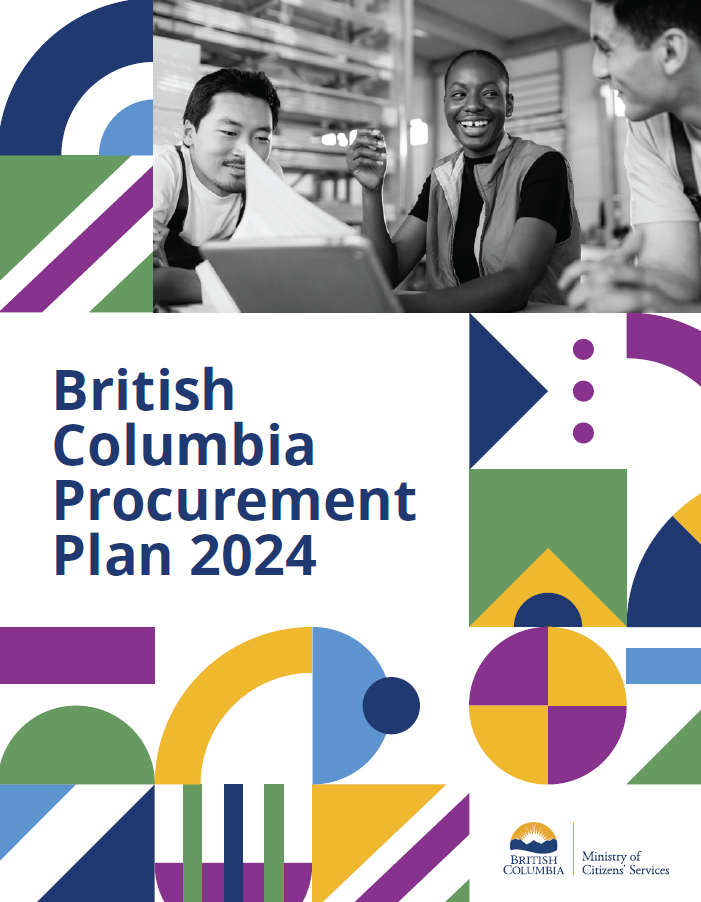BC Procurement Plan 2024

Each year, the government of British Columbia spends billions of dollars procuring goods and services to deliver on its priorities for the people and communities of B.C. We spend this money using fair, transparent, non-discriminatory, open, and competitive procurement practices to ensure value for money and accountability.
We see opportunities to leverage government spending to address some of our biggest priorities, such as:
- reconciliation with Indigenous Peoples,
- tackling climate change,
- supporting jobs and training,
- ensuring public safety, and
- keeping services affordable.
The decision-making process for every government purchase or procurement in British Columbia must prioritize the best interests of the people of B.C., local communities, local economies, and the environment.
The British Columbia Procurement Plan lays out the framework for our procurement practices to responsibly help drive change towards a more equitable, accessible, and sustainable economy for everyone.
This plan for the way government procures goods and services works within the existing legislation, policy, and trade agreements that regulate public procurement in B.C.
Additionally, through a decentralized procurement model, we rely on accountability and the procurement principles of fair, transparent, non-discriminatory, open, and competitive procurement practices to ensure value for money.
How we got here
In 2018, government released its first procurement plan, the Procurement Strategy, designed to improve procurement, realize value for money, and create benefits for communities.
This means using procurement intentionally to improve social and environmental outcomes and promote innovation; simplifying processes to make them more intuitive; supporting, growing and sustaining a community of suppliers; and enhancing training and support within the BC Public Service.
Since then, some major and profound events have occurred. We are still recovering from the disruption and far-reaching impact of the global pandemic, not to mention the effects of climate change – the heat dome, wildfires, and flooding.
For government, these events have only underscored the need, and accelerated our work, to think about how we make purchasing decisions that consider the impacts and benefits for people, the environment, and the economy.
Since 2018, we have made progress to innovate and transform our purchasing processes to make it easier for vendors and government buyers to work with each other. Accomplishments and progress include:
- BC Bid – renewed the Province’s online marketplace for procuring goods and services.
- Indigenous Procurement Initiative – as a result of a province-wide engagement to identify ways to increase Indigenous participation in B.C. government procurement, established an External Advisory Committee to co-develop a plan to address gaps, barriers, and inequities that Indigenous vendors face.
- Launched Sprint With Us, Code With Us, and Team with Us – electronic process to quickly establish agile product development contracts with vendors of all sizes.
- Social Purchasing Guidelines – developed guidelines for procurements under $75,000 that support government’s social policy objectives.
- Guidelines for Environmentally Responsible Procurement – published guidance on how to include environmentally responsible products and services as part of government purchasing decisions.
- Feed BC – increased B.C. food and beverages in government and public institutions through activities, including procurement practices to build B.C. food demand, awareness, and connections, resulting in the growth of local food businesses, communities, and economies.
- Clean BC Government Fleet – implemented innovative procurement practices to increase government access to zero emission vehicles (ZEVs) and charging services to contribute to reducing government’s Greenhouse Gas (GHG) emissions by 40% below 2010 levels, by 2030.
The impact on provincial supply chains continues. The lesson from this difficult time is clear: to tackle the complex problems facing our province we must ensure every purchasing decision we make considers the impacts and benefits for people, the environment, and the economy.
Where we're going
Looking ahead, and working collaboratively, we know there are opportunities to leverage government spending to address some of our biggest priorities, such as reconciliation, climate change, public safety, and economic growth. This new Procurement Plan builds on the base we have established together and reflects input from across the BC Public Service.
In developing this plan, the Ministry of Citizens’ Services referred to the advice, considerations, and concerns from buyers and vendors. We continue to work closely with public servants across government to better understand the challenges and identify opportunities to address those challenges. You will see this input reflected in the three missions, actions, and initiatives to be undertaken.
Together, through our purchasing decisions, we can obtain the best possible value for all British Columbians, advance important social and economic objectives and improve procurement.
The missions
By using procurement as a strategic lever for change, this plan aligns with government priorities, including Stronger BC, CleanBC Roadmap to 2030, and implementing the Declaration on the Rights of Indigenous Peoples Act.
With the needs of the public, buyers, and suppliers in mind, we’re making sure public dollars unlock a brighter future for everyone through the three strategic missions:

 Mission 1: Leverage purchasing power
Mission 1: Leverage purchasing power
Use government’s purchasing power to advance reconciliation with Indigenous Peoples, improve social and environmental outcomes, and promote innovation.
Procurement can be a strategic lever that can contribute to achieving government priorities. By considering the impacts for people first, we can make strides towards government’s reconciliation, social, and environmental goals. Prioritizing the positive impacts that can flow from government procurements, rather than the lowest price, will contribute to an equitable and sustainable economy with opportunity for everyone.
Government calls to action
Drive responsible sourcing.
By including principles-based criteria, almost every procurement is an opportunity to advance Indigenous, social, environmental, and economic outcomes. B.C. government buyers must:
- Apply the Social Impact Purchasing Guidelines when purchasing services under $75,000. This may include seeking services from traditionally underrepresented groups.
- Apply the Environmentally Responsible Procurement Guidelines when purchasing goods to minimize negative impacts on the environment.
- Evaluate all other purchases with the lens of adding social, Indigenous, environmental, or economic criteria to ensure best overall outcomes for all British Columbians.
Leverage government’s buying power.
Corporate supply arrangements provide opportunities for thousands of contracts on quicker timelines and with cost savings, resulting in better value for taxpayers. B.C. government buyers must:
- Use Corporate Supply Arrangements to leverage government’s buying power and work with the Procurement and Supply Division to establish new ones where there is increased demand for specific services or goods.
How we’re supporting these actions:
The Ministry of Citizens’ Services will:
- Continue to work with ministries to identify and support procurement processes for better social and environmental outcomes, including adding to the number of corporate supply arrangements available across government.
- Continue to work with Indigenous Procurement Initiative's External Advisory Committee to co-develop a plan to identify and address gaps faced by Indigenous vendors.
- Expand the availability of Indigenous-specific corporate supply arrangements across government.
- Support the advancement of social, Indigenous, environmental, and economic outcomes through the Impact Procurement Pilot program. Use learnings from the pilot program to create guidelines and resources for use across government
 Mission 2: Increase supplier access
Mission 2: Increase supplier access
Make it easier for vendors of all sizes to work with government.
The government of British Columbia remains committed to making it easier for vendors of all sizes and types to participate in provincial procurement opportunities. We must ensure that all vendors have equitable access to procurement opportunities and the resources they need to participate.
That means streamlining processes, working with the vendor community to provide education and assistance, and balancing the risks and rewards of doing business to incentivize innovation. We will continue to collaborate with B.C.’s resilient and diverse vendor community to ensure equitable access.
Government calls to action
Make it easier for vendors of all sizes and types to work with us.
When government embraces market-driven innovation, we open more doors to solutions with positive impacts on people and the environment. B.C. government buyers must:
- Engage with vendors through Requests for Information (RFI) and Discovery Day events to understand solutions available in the marketplace to government challenges.
- Inform the marketplace early of significant upcoming planned procurements, giving all potential suppliers adequate time to prepare the highest quality proposal.
Equitable access for all vendors.
Big or small, all vendors need equitable access to government procurements. To increase participation by diverse businesses and communities B.C. government buyers must:
- Collaborate across government to identify gaps and opportunities to increase participation by diverse vendors and communities in procurements.
- Use BC Bid to provide transparency in purchases.
How we’re supporting these actions:
The Ministry of Citizens’ Services will:
-
Develop a framework to help buyers include measures for buying local in their purchasing criteria where suitable.
- Learn from B.C. small vendors what barriers they face in selling their goods and services to government and explore training and support tools to remove those barriers.
- Support Ministries in their use of RFIs and Discovery Day events to better connect with the marketplace and find solutions to government challenges.
- Lead a pilot project to make procurement and contract documents more accessible including the use of plain language.
 Mission 3: Build capacity
Mission 3: Build capacity
Build greater capacity for procurement in the BC Public Service through enhanced career planning, training, and support.
To transform the way government purchases goods and services, the public sector needs procurement professionals who have up-to-date training, and have access to, and knowledge of, procurement tools, policies, and supports. More robust training resources and well-defined career pathways will set procurement professionals up for success and help to modernize public procurement in B.C.
By equipping the next generation of procurement professionals with the resources and supports they need, we can accelerate the transition to more impactful government purchasing that supports government priorities.
Government calls to action
Build procurement knowledge.
When we share knowledge and wise practices, we open the door to collaboration and innovation that transforms how we purchase goods and services. In partnership with the BC Public Service Agency, B.C. government buyers must:
- Require all public servants involved in procurement and contract management to have baseline procurement and contract management knowledge through Procurement Foundations training.
- Support all government buyers in receiving up to date procurement and contract management skills training.
- Collaborate across government to identify gaps, opportunities, and share knowledge to build good procurement practice standards.
How we’re supporting these actions:
The Ministry of Citizens’ Services will:
- In partnership with the BC Public Service Agency, create and promote clear career pathways in procurement to recruit and retain procurement professionals within the BC Public Service.
- Update procurement training, support, and tools that will lead to improved and consistent business performance for all B.C. government procurement professionals.
- Develop operational policy, guidelines, and resources, and improve tools and templates to create consistency in the way procurement professionals purchase goods and services and make it easier do business with government.
Putting the plan into action
As we implement this revitalised vision for the future of procurement in B.C., we will continue to learn from the vendor community, explore future actions, and work across government to drive change. Procurement can and must be leveraged to help meet some of British Columbia’s biggest priorities.
While progress has been made to modernize procurement processes, we have more work to do. The Deputy Ministers’ Committee on Procurement and Strategic Contracts will champion the implementation of the three missions in purchases across government. To help government deliver on this plan, the Ministry of Citizens’ Services will develop tools, provide supports, and every two years will showcase progress from across government that demonstrates procurement as a strategic lever for change.
These missions and calls to action will help the government of B.C. build an economy that honours Indigenous rights, values, and interests, is sustainable and inclusive, and creates opportunities for everyone.

Download the PDF
Resources
Contacts
Subscribe
Enter your email address to subscribe to updates of this page.

